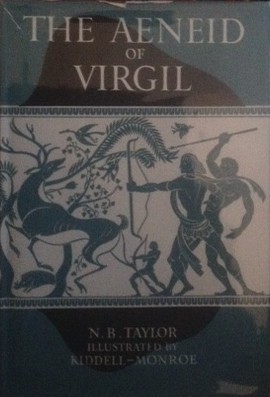Inspiring Older Readers
 posted on 24 Mar 2018
posted on 24 Mar 2018
The Aeneid of Virgil translated into prose by N.B.Taylor illustrated by Joan Kiddell-Monroe
I am pitifully ignorant when it comes to some of the major texts of the Classical world. I have read substantial chunks of Homer’s The Odyssey, in translation, and small chunks of The Iliad but beyond that I’ve been confined to the Greek dramatic tragedies I was required to read at university. As I said, pitiful.
Written in Latin sometime between 29 and 19 BCE, Virgil’s contribution to the epic genre is something I’ve never even picked up before and so when I came across this 1961 Oxford University Press edition I thought it was time I gave it a go. To be honest, I was attracted to this by two things: it’s a prose translation probably targeted at older teenage readers as well as adults and it’s illustrated. Kindell-Monroe’s highly stylised drawings aren’t so much an illustration of the action but more a decoration that helps set the overall tone of the text.
These Classical epics are often cited as the foundation stones for much of Western literature and, as such, try to capture in story form the myths that explain the working of the natural world, what it means to be human, humanities position in that natural order and the origins of our social order. Having said that, I find them extraordinarily difficult to read.
The Aeneid acts as a sort of sequel to Homer’s epics and picks up the story of the Trojan, Aeneas and his followers who escaped the final sack of Troy by the Greeks. The epic starts with the legendary wooden horse ploy used by the Greeks to get access to Troy and follows the escaping Aeneas as he heads off to establish a new city in what is modern day Italy. By legend he became the founding father of modern day Rome and, by extension, the eventual Roman Empire.
Just as Homer tells the tale of Odysseus as a journey punctuated by peril and adventure, Virgil also sends his hero on a similar journey in which final success will depend on two things: bravery and help from the Gods. And it is the Gods who in many ways dominate this tale as they use their personal loves and hates to either hasten or derail the journey.
Each intervention by a God triggers a task that must be overcome or the offer of a significant helping hand and it’s striking just how capricious and fundamentally unfair Virgil paints the Gods to be. Winds, earthquakes, misunderstandings, life and death are only explicable to humanity as the whims and fancies of the Gods and justice seems to hinge on whether an immortal likes you or not.
For me the story of the tragic love of Queen Dido for Aeneas and her consequent suicide is one of the standout sections of the epic but my absolute favourite was Aeneas’ journey to the dark underworld of Pluto, God and custodian of the dead, to seek guidance from his father.
I must admit that I ultimately found the book a bit of a trial and quite a hard read to stick with. For me the lack of character development and the fact that the major protagonists had no real sense of agency and their fate was predetermined removed any sort of narrative drive. I don’t really know whether this is the consequence of the prose translation that Taylor has provided but I couldn’t help but feel each new task or challenge Aeneas and his men faced just became another rather two-dimensional event which was curiously devoid of emotional consequence.
Picking up and reading an acknowledged classic is always a bit of a risk – what happens if you find a seminal text dull? What happens if you just end up spotting the references, events or phrases that have passed into common modern usage? Well, both of these things happened to me but I’m glad I gave it a go. I will, I think, take a look at a more modern translation and see whether that makes a difference.
Terry Potter
March 2018
( Click on any of the images below to see them in slide show mode )




